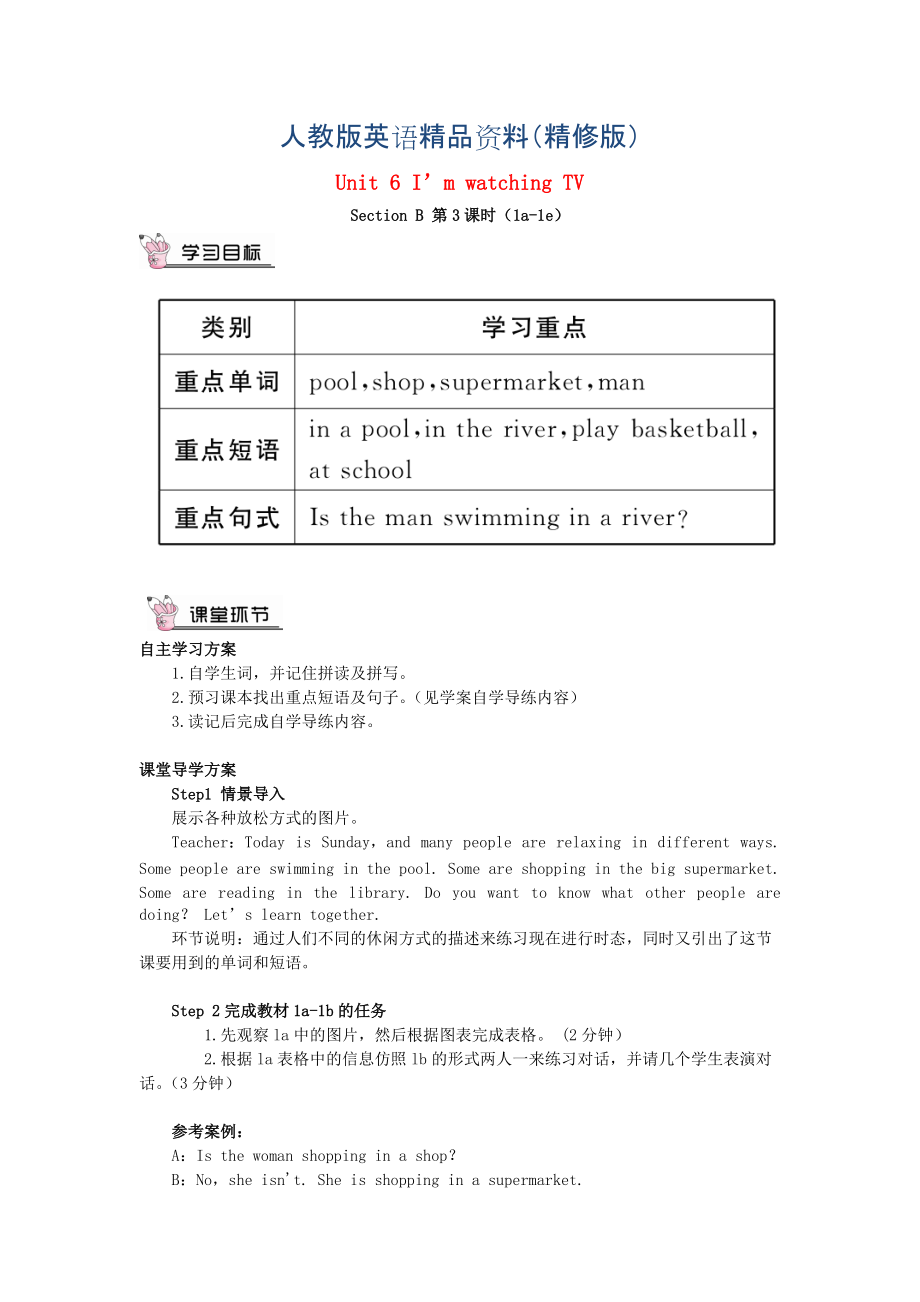《七年級(jí)英語(yǔ)下冊(cè) Unit 6 I’m watching TV Section B第3課時(shí)導(dǎo)學(xué)案 人教新目標(biāo)版精修版》由會(huì)員分享�����,可在線閱讀�����,更多相關(guān)《七年級(jí)英語(yǔ)下冊(cè) Unit 6 I’m watching TV Section B第3課時(shí)導(dǎo)學(xué)案 人教新目標(biāo)版精修版(2頁(yè)珍藏版)》請(qǐng)?jiān)谘b配圖網(wǎng)上搜索�����。
1、人教版英語(yǔ)精品資料(精修版)
Unit 6 I’m watching TV
Section B 第3課時(shí)(1a-1e)
自主學(xué)習(xí)方案
1.自學(xué)生詞�����,并記住拼讀及拼寫(xiě)�����。
2.預(yù)習(xí)課本找出重點(diǎn)短語(yǔ)及句子�����。(見(jiàn)學(xué)案自學(xué)導(dǎo)練內(nèi)容)
3.讀記后完成自學(xué)導(dǎo)練內(nèi)容�����。
課堂導(dǎo)學(xué)方案
Step1 情景導(dǎo)入
展示各種放松方式的圖片�����。
Teacher:Today is Sunday�����,and many people are relaxing in different ways. Some people are swimming in the pool. Some are
2�����、 shopping in the big supermarket. Some are reading in the library. Do you want to know what other people are doing�����? Let’s learn together.
環(huán)節(jié)說(shuō)明:通過(guò)人們不同的休閑方式的描述來(lái)練習(xí)現(xiàn)在進(jìn)行時(shí)態(tài)�����,同時(shí)又引出了這節(jié)課要用到的單詞和短語(yǔ)�����。
Step 2完成教材1a-1b的任務(wù)
1.先觀察la中的圖片�����,然后根據(jù)圖表完成表格�����。 (2分鐘)
2.根據(jù)la表格中的信息仿照l(shuí)b的形式兩人一來(lái)練習(xí)對(duì)話�����,并請(qǐng)幾個(gè)學(xué)生表演對(duì)話。(3分鐘)
參考案例:
A:
3�����、Is the woman shopping in a shop�����?
B:No�����,she isn't. She is shopping in a supermarket.
3.小結(jié)訓(xùn)練�����。(1分鐘)
It’s 2:00 in the afternoon�����,and my mother B .
B A. shops B. is shopping
C. swims D. watching
環(huán)節(jié)說(shuō)明:這個(gè)環(huán)節(jié)的對(duì)話和習(xí)題練習(xí)�����,讓學(xué)生熟練掌握現(xiàn)在進(jìn)行時(shí)態(tài)的一般疑問(wèn)句�����。
Step 3 完成教材1c-1e的任務(wù)
1.聽(tīng)錄音�����,將聽(tīng)到的內(nèi)容填在相對(duì)應(yīng)的表格中�����,完成lc�����。
4�����、(3分鐘)
2.再聽(tīng)一遍錄音�����,學(xué)生跟讀�����,并模仿語(yǔ)音語(yǔ)調(diào)�����。 (3分鐘)
3.兩人一組根據(jù)表格中的信息仿照l(shuí)e形式編寫(xiě)新的對(duì)話練習(xí),邀請(qǐng)幾組學(xué)生表演自編對(duì)話�����。(4分鐘)
4.小結(jié)訓(xùn)練�����。(2分鐘)
(l)根據(jù)句意�����,選擇方框中的單詞并用其適當(dāng)形式填空。
Pool �����,shop �����, supermarket
① I want to go to the to buy some vegetables.
②Jack usually swims in a pool .
③—Do you like shopping �����?
—Yes,I always buy some usef
5�����、ul things.
(2)句型轉(zhuǎn)換�����。
①M(fèi)y brother is doing his homework.(改為一般疑問(wèn)句)
Is your brother doing his homework�����?
②They are playing computer games.(改為否定句)
They aren' playing computer games.
③My mother is watching TV.(對(duì)畫(huà)線部分提問(wèn))
What is your mother doing�����?
④Is she writing a letter to her uncle�����?(作否定回答)
No�����,she isn't.
環(huán)節(jié)說(shuō)明:通過(guò)聽(tīng)說(shuō)訓(xùn)練�����,學(xué)生更熟練地掌握交際用語(yǔ),通過(guò)小結(jié)訓(xùn)練�����,語(yǔ)言目標(biāo)得以強(qiáng)化�����。
Step4 問(wèn)題探究
shop的用法:
她媽媽正在超市里購(gòu)物�����。
Her mother is shopping in the supermarket.
【注意】shop既可以作為動(dòng)詞�����,也可以作為名詞。常用詞組 do some shopping=go to the shop�����。
Step 5 家庭作業(yè)
完成課后提升作業(yè)(學(xué)案p. 38)�����。
教學(xué)反思
本課時(shí)通過(guò)圖片展示導(dǎo)入新知識(shí)�����,增加課堂趣味性;結(jié)合聽(tīng)說(shuō)訓(xùn)練、結(jié)對(duì)對(duì)話形式�����,提高學(xué)生的口語(yǔ)交際能力�����。
 七年級(jí)英語(yǔ)下冊(cè) Unit 6 I’m watching TV Section B第3課時(shí)導(dǎo)學(xué)案 人教新目標(biāo)版精修版
七年級(jí)英語(yǔ)下冊(cè) Unit 6 I’m watching TV Section B第3課時(shí)導(dǎo)學(xué)案 人教新目標(biāo)版精修版

